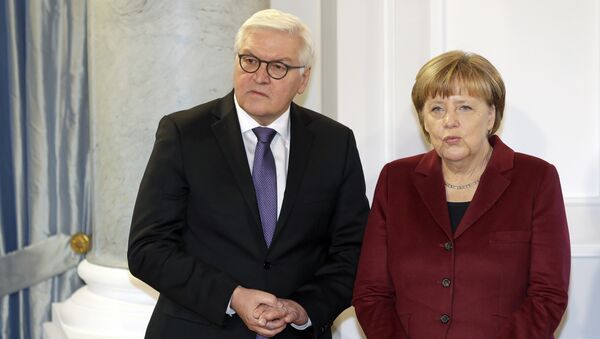Four weeks of negotiations to form a new German government have collapsed after the Free Democratic Party (FDP) dramatically walked away from the talks on Sunday night. German Chancellor Angela Merkel has said that new elections are the best bet for the country's next government and confirmed her intention to lead her party into a snap vote.
FDP leader Christian Lindner announced his party's withdrawal after 12 hours of last-ditch talks. He said that the FDP had wanted to usher in a political "change in trend" but this had proved impossible.
"It is better not to govern than to govern in the wrong way," Lindner tweeted.
Rest of Jamaica gang might call Lindner’s action irresponsible, but walking out of talks after surprisingly tough stance on migration could indicate strategy similar to one that made Kurz successful in Austria. If so, FDP could draw votes from CDU & AfD.
— Philipp Liesenhoff (@P_Liesenhoff) 20 ноября 2017 г.
The four participants in the "Jamaica Coalition" talks were Merkel's center-right Christian Democratic Union (CDU) and its Bavarian sister party, the Christian Social Union (CSU), the Greens and the classically liberal FDP. The parties' colors gave rise to the nickname "Jamaica."
Disagreements over such issues as migration and climate change, in particular between the FDP and the Greens, reportedly prevented the parties from reaching a deal. In contrast to the FDP, the Green party leadership has said it is willing to take part in more negotiations.
Recriminations have begun since Lindner pulled out of the negotiations. Politicians from the CDU and the Greens have attacked Lindner for walking out, while the FDP has pointed the finger at Merkel for her "chaotic" organization of the talks.
"The negotiations were chaotic from the beginning, they were not structured, they were not organized," FDP politician Volker Wissing told Deutschlandfunk.
Steinmeier Says Situation is Unprecedented in 70 Years
After meeting with Chancellor Angela Merkel at Bellevue Palace on Monday, German President Frank-Walter Steinmeier said that the breakdown of political negotiations to form the next government has left Germany facing an unprecedented situation.
"Eight weeks since the Bundestag elections, talks to form a new government have so far failed to yield results. We are now facing a situation that has never happened before in the history of the Federal Republic of Germany, that is for almost 70 years," Steinmeier said.
#Germany president Steinmeier calls on parties to resume responsibility, says will talk to CDU/CSU, FDP, the Greens but also to SPD. #JamaikaAbbruch pic.twitter.com/6tHX1c9UJQ
— Yannis Koutsomitis (@YanniKouts) 20 ноября 2017 г.
According to Bild, President Steinmeier is planning to hold talks on Tuesday morning with the leaders of the CSU, the FDP, the Greens and the Social Democratic Party (SPD). However, the SPD has ruled itself out of another "grand coalition" with Merkel's CDU/CSU.
"We will not enter into a grand coalition," SPD leader Martin Schulz said on Monday. "We think that new elections are the right way forward."
A Minority Government?
The CDU/CSU could still agree to form a minority government with the Greens. However, Merkel has told Germany's ZDF broadcaster that she is not planning to lead a minority government.
"i don't want to think about about minority governments… Germany needs a stable government. In this respect, I am sceptical… it is still my goal to build a stable government," Merkel said, according to Tagesspiegel.
The right-wing Alternative for Germany (AfD), which gained the third-largest number of seats in the German Bundestag folowing September's elections, has also ruled itself out of government.
"We will be ready for talks on government participation in 2021 at the earliest," leading AfD politician Joerg Meuthen told RedaktionsNetzwerk Deutschland.
AfD Calls for Merkel's Resignation
AfD party leader Alexander Gauland has already called for Angela Merkel to resign.
"The "time has come" for Angela Merkel to leave the office of chancellor because she "failed" to form a new German coalition government, Gauland said.
Here's the latest poll I could find by public broadcaster ARD (Nov 17), essentially the same as before, but the next will probably vary a bit. My guess is we are indeed headed for a new election in 2018, though I'm told, constitutionally, Merkel *must* try minority gov' first. pic.twitter.com/uNKGSgq0hx
— Francisco Pérez (@FranciscoJPGz) 20 ноября 2017 г.
Sonntagsfrage zur Bundestagswahl • Forsa für RTL/n-tv: CDU/CSU 31 % | SPD 21 % | AfD 12 % | GRÜNE 12 % | FDP 10 % | DIE LINKE 9 % | Sonstige 5 %
— Wahlrecht.de (@Wahlrecht_de) 20 ноября 2017 г.
➤ https://t.co/Mniu5kTT1u pic.twitter.com/uF6z8xelRM
A Forsa poll conducted for RTL television on Sunday
According to opinion polls, another election is likely to yield similar results to the September 24 vote. That gave the CDU/CSU 32.9% of the popular vote, followed by the SPD (20.5%) and the AfD (12.6%).
"Worst Case Scenario"
There is concern about the German situation in other EU countries. Dutch Minister of Foreign Affairs Halbe Zijlstra said that "new elections are the worst case scenario."
"They've only had one round of talks. In the Netherlands it took us over seven months. According to me, they still have five months to go. So I would say: think about it again, maybe start talking again, instead of new elections." Zijlstra told the Netherlands' RTL Nieuws.
In Moscow, Kremlim spokesman Dmitry Peskov said Moscow hopes that Germany will complete the process of forming a government "successfully as soon as possible," adding that Russia sees the issue as an internal affair for Germany.
According to data from Bloomberg, the euro single currency fell in value by 0.42% against the dollar and 0.53% against pound sterling on Monday amid the uncertainty in Germany.



